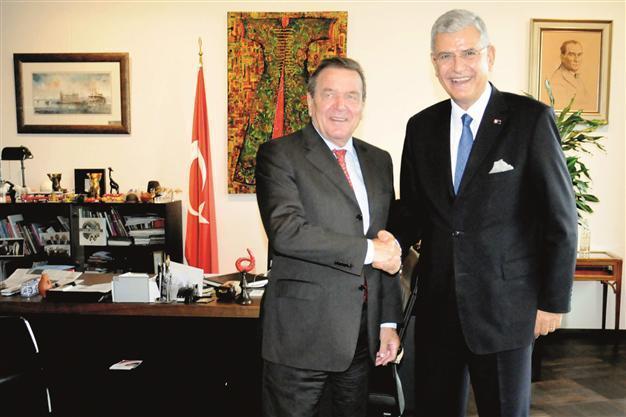Turkey could help to build EU army: Minister Bozkır
ANKARA

EU Minister Volkan Bozkır meets with former German Chancellor Gerhard Schröder in a closed meeting at the Turkish Embassy in Berlin. Bozkır said the two discussed the current situation in Turkey’s neighborhood. AA Photo
If Turkey becomes a member of the European Union, the EU would be able to establish an army of 60,000 soldiers, Turkish Minister for EU Affairs and Chief Negotiator Volkan Bozkır has said during a visit to Berlin.
Bozkır said the EU had always only been able to hold “soft power” due to the lack of a single European army, which Turkey could have helped form if it had been made a member before, daily Milliyet reported.
“EU is in a superpower position but it has been unable to build its army. The EU is always in the “soft power” stance because it cannot establish a European army consisting of 60,000 soldiers.
It therefore does not have effective power when intervening [in an issue] as it cannot support itself militarily,” he said, adding that there were not many member states that were willing to form such an army.
Criteria for key pointsBozkır said Turkey met the EU criteria for accession on key points “that will strategically affect EU’s future”: A strong economy, a young and industrious population, and Turkey’s strategic position on energy supply routes, with the country in a region where 70 percent of world’s oil and natural gas resources are located. The fourth key element where Turkey meets the EU criteria is its armed forces, he stressed.
During his visit to Berlin, Bozkır came together with former German chancellor Gerhard Schröder in a closed meeting at the Turkish Embassy. Bozkır said the two discussed the current situation in Turkey’s neighborhood and he tried to explain the negative perception that was formed in the German press about recent incidents in Turkey.
The EU minister also met with German Justice Minister Heiko Maas, and was set to meet the German Parliament Vice-President Claudia Roth.
The EU released its yearly progress report on Turkey early Oct. in which the European Commission identified government interference in the judiciary and bans imposed on social media as major sources of concern regarding Turkey’s candidacy for full membership.
Bozkır, who took over his current post from current Foreign Minister Mevlüt Çavuşoğlu more than a month ago, had used noticeably positive language when discussing the content of the report, describing it as “constructive and objective.”
